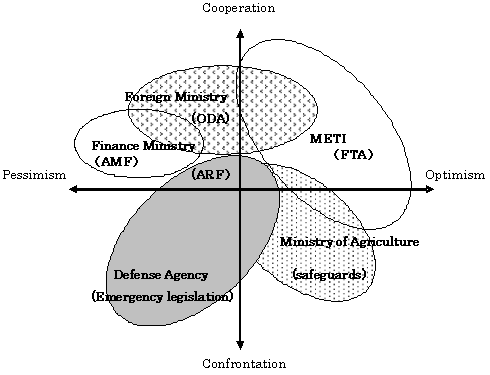The way the Japanese view China is wavering greatly. The pessimism that prevailed during the Asian currency crisis has swiftly receded to be replaced by optimism, and then a sense of concern that China is a threat. More recently, efforts to make better use of China's vitality have finally begun to gather steam at the corporate level, and moves to cooperate with China, such as through free trade agreements, have also become more prominent at the government level. The Japanese perception of China can be can be categorized into four groups based on two basic axes - whether they are optimistic or pessimistic regarding China's future and whether they are antagonistic toward China because they see it as a threat or whether they are cooperative because they view it as a partner. This categorization also shows us the various stances Japanese government ministries take vis-a-vis China.
Diagram : The stances of government ministries and agencies toward China

The optimistic view sees the Chinese economy continuing to grow at a high pace and joining the ranks of developed countries in the near future. This view is held by the Ministry of Economy, Trade and Industry and the Ministry of Agriculture, Forestry and Fisheries. However, the stances taken by the two ministries toward China differ. METI places importance on the profits of Japanese industry, which enjoys a complementary relationship with China. Thus, it is cooperative regarding such matters as concluding a free trade agreement in East Asia so that Japan's economic ties with the region, including China, are enhanced. At the same time, the ministry believes such policies will encourage an international division of labor according to comparative advantage, while at the same time help upgrade Japan's industrial structure. This position is also held by many economists as well as corporate leaders who believe that China offers substantial business opportunities. The Ministry of Agriculture, Forestry and Fisheries, however, takes a confrontational approach toward China, as can be seen in the spat over safeguards that we saw last year. This attitude stems from concerns that further growth in China may lead to a food shortage that will trigger a surge in the international prices of foodstuffs or, on the contrary, enable it to produce food in excess and export to Japan, thereby inflicting major damage to domestic farmers.
On the other hand, the pessimistic view among government bodies is based on concerns that China's economic growth will at some point hit an impasse and the ensuing political and social instability will divide the country or throw it into confusion. This view is held by the Foreign Ministry and the Finance Ministry, and both ministries take a cooperative stance toward China. First, the Foreign Ministry offers cooperation via official development assistance out of the belief that by building up China's infrastructure and reducing the gap between rich and poor, such aid will help China's economy grow, remove the seeds of social instability and effectively shield Japan from any adverse effects. Meanwhile, the Finance Ministry - especially its International Bureau - is promoting the Asian Monetary Fund scheme in an effort to cooperate with China and the rest of East Asia out of concerns that the currency and financial crises experienced by the newly emerging Asian economies such as Thailand could also strike China, which is being pressured to open its financial markets with its entry into the World Trade Organization.
Finally, the Defense Agency, while trying to forge a harmonious relationship with China through such gatherings as the ASEAN Regional Forum, is wary of China becoming a major military power. It is especially concerned that given the single party rule of the Communist Party, there are elements of political and social instability regarding such issues as human rights and Taiwan. In order to prevent any confusion triggered by such instability from affecting Japan, the agency is taking a confrontational approach toward China, including the drafting of legislation dictating the emergency measures that Japan can take in the event of a military conflict.
As seen above, the policies pursued by individual ministries and agencies regarding China are all based on different philosophies and premises, and there is no one consistent "national policy" toward China. Furthermore, the political and economic situation both at home and abroad, coupled with public opinion that is easily swayed by such events, greatly decides which ministry has the greatest relative influence over the others at a particular time. As a result, policy measures are all too often inconsistent and off the cuff. As can be seen by the saying that diplomacy is an extension of domestic policy, it is impossible for international cooperation to go smoothly when there is discord among government ministries and agencies at home. This may be one reason why there is repeated friction between Japan and China.


